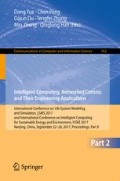Abstract
The outputs of Metal Oxide Semiconductor (MOS) gas sensors drift due to the change of temperature and humidity in the environment. This phenomenon leads to additional errors in the measurement and the test precision and measurement stability of gas sensor are greatly affected. A novel strategy for temperature and humidity compensation for MOS Gas Sensor is proposed in this paper. The environmental gas concentrations are measured separately and accurately based Random Forest (RF) method to demonstrate that the proposed strategy is superior at both accuracy and runtime compared with the conventional methods, such as RBF neural network and BP neural network. Results show that the proposed methodology provides a better solution to temperature and humidity drift. The accuracy of the environmental gas sensor array improves about 1%.
Access this chapter
Tax calculation will be finalised at checkout
Purchases are for personal use only
References
Shigeki, H., Haruhiko, K., Takashi, O.: Dynamic model to estimate the dependence of gas sensor characteristics on temperature and humidity in environment. J. Sens. Actuators B. 60, 78–82 (1999)
Zhang, L., Tian, F.C., Peng, X.W., et al.: Concentration estimation of formaldehyde using metal oxide semiconductor gas sensor array based e-noses. Sens. Rev. 34(3), 284–290 (2014)
Zhang, L., Zhang, D.: Domain adaptation extreme learning machines for drift compensation in E-nose systems. IEEE Trans. Instrum. Measur. 64(7), 1790–1801 (2015)
Haugen, J.E., Tomic, O., Kvaal, K.: A calibration method for handling the temporal drift of solid state gas-sensors. Anal. Chim. Acta 407, 23–39 (2000)
Lee, Y.T., Seo, H.D., Kawamura, A., et al.: Compensation method of offset and its temperature drift in silicon piezoresistive pressure sensor using double wheatstone-bridge configuration. In: The International Conference on Solid-State Sensors and Actuators, 1995 and Eurosensors IX, Transducers, 570–573. IEEE (1995)
Ishikawa, T., Nakayama, A., Niimi, H., et al.: Semiconductor ceramics having negative temperature coefficients of resistance. US20010001205. P (2001)
Marinković, Z., Atanasković, A., Xibilia, M.G.: A neural network approach for safety monitoring applications. IEEE Instrum. Measur. (2016)
Nenova, Z., Dimchev, G.: Compensation of the impact of disturbing factors on gas sensor characteristics. Acta Polytech. Hung. 10, 97–113 (2013)
Breiman, L.: Random Forest. Mach. Learn. 45, 5–32 (2001)
Breiman, L.: Bagging predictors. Mach. Learn. 24(2), 123–140 (1996)
Chen, C., Breiman, L.: Using random forest to learn imbalanced data. J. (2004)
Cui, D., Bo, J.: Comprehensive evaluation of water ecological civilization based on random forests regression algorithm. Adv. Sci. Technol. Water Resour. (2014)
Acknowledgments
This work is supported by the National Natural Science Foundation of China (Nos. 61201306, 61327804 and61271094) and National High-Tech R&D Program of China (No. 2014AA06A505).
Author information
Authors and Affiliations
Corresponding author
Editor information
Editors and Affiliations
Rights and permissions
Copyright information
© 2017 Springer Nature Singapore Pte Ltd.
About this paper
Cite this paper
Xu, P., Song, K., Xia, X., Chen, Y., Wang, Q., Wei, G. (2017). Temperature and Humidity Compensation for MOS Gas Sensor Based on Random Forests. In: Yue, D., Peng, C., Du, D., Zhang, T., Zheng, M., Han, Q. (eds) Intelligent Computing, Networked Control, and Their Engineering Applications. ICSEE LSMS 2017 2017. Communications in Computer and Information Science, vol 762. Springer, Singapore. https://doi.org/10.1007/978-981-10-6373-2_14
Download citation
DOI: https://doi.org/10.1007/978-981-10-6373-2_14
Published:
Publisher Name: Springer, Singapore
Print ISBN: 978-981-10-6372-5
Online ISBN: 978-981-10-6373-2
eBook Packages: Computer ScienceComputer Science (R0)

